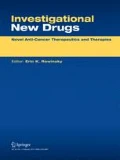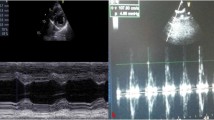Abstract
This study was designed to investigate the chronic cardiotoxic potential of SM-5887 and a possible deteriorating effect of SM-5887 on low-grade cardiotoxicity pre-induced by doxorubicin in beagle dogs. In the chronic treatment, beagle dogs of each sex were given intravenously once every 3 weeks, either a sublethal dose of doxorubicin (1.5 mg/kg) or SM-5887 (2.5 mg/kg). The experiment was terminated 3 weeks after the ninth dosing. Animals which received over six courses of doxorubicin demonstrated the electrocardiogram (ECG) changes, decrease of blood pressure and high-grade histopathological cardiomyopathy, while animals which were terminally sacrificed after the SM-5887 administration did not show any changes in ECG, blood pressure and histopathological examinations. To examine a possibly deteriorating cardiotoxic effect of SM-5887, low-grade cardiomyopathy was induced in dogs by four courses of doxorubicin (1.5 mg/kg). Nine weeks after pre-treatment, dogs were given four courses of either doxorubicin (1.5 mg/kg) or SM-5887 (2.5 mg/kg) once every 3 weeks. The low-grade cardiotoxic changes were enhanced by the additional doxorubicin treatment. On the contrary, the SM-5887 treatment did not progress the grade of cardiomyopathy. In conclusion, SM-5887 does not have any potential of chronic cardiotoxicity and deteriorating effect on doxorubicin-induced cardiotoxicity in dogs.
Similar content being viewed by others
References
Morisada S, Yanagi Y, Kashiwazaki Y, Fukui M: Toxicological aspects of a novel 9–aminoanthracycleine, SM-5887. Jpn J Cancer Res 80: 77–82, 1989
Morisada S, Yanagi Y, Noguchi T, Kashiwazaki Y, Fukui M: Antitumor activities of a novel 9–aminoanthracycleine (SM-5887) against mouse experimental tumor and human tumor xenografts. Jpn J Caner Res 80: 69–76, 1989
Bertazzoli C, Bellini O, Magrini U, Tosana MG: Quantitative experiment evaluation of adriamycin cardiotoxicity in the mouse. Cancer Treat Rep 63: 1877–1883, 1979
Yamazaki M, Noguchi Y, Tanda M, Shintani S: Statistical methods appropriate for general toxicological studies in rats. Algorithms for multiple comparisons of treatment groups with control. J Takeda Res Lab 40(3/4): 163–187, 1981
Iatropoulos MJ: Anthracycline cardiomyopathy, Predictive value of animal models. Cancer Treat Symp 3: 3–17, 1984
Danesi R, Marchetti A, Bernardini N, La Rocca R, Bevilacqua G, Del Tacca M: Cardiac toxicity and antitumor activity of 40–deoxy-4′-iodo-doxorubicinol. Cancer Chemother Pharmacol 26: 403–408, 1990
Mettler FP, Young DM, Ward JM: Adriamycin-induced cardiotoxicity (cardiomyopathy and congestive heart failure) in rats. Cancer Res 37: 2705–2708, 1977
Herman EH, Ferrans V, Jordan W, Ardalan B: Reduction of chronic doxorubicin cardiotoxicity by ICRF-187 in rabbits. Commun Chem Pathol Pharmacol 31: 85–97, 1981
Olsen HM, Capen CC: Chronic cardiotoxicity of doxorubicin (adriamycin) in the rat, morphologic and biochemical investigations. Toxicol Appl Pharmacol 44: 605–616, 1978
Gralla EJ, Fleischman RW, Luthra YK, Stadnicki SW: The dosing schedule dependent toxicities of adriamycin in beagle dogs and rhesus monkeys. Toxicology 13: 263–273, 1979
Herman E, Ferrans V, Myers C, Van Vleet J: Comparison of the effectiveness of (±)-1,2–bis(3,5–dioxopiperazinyl-1–yl)propane (ICRF-187) and N-Acetyl-cysteine in preventing chronic doxorubicin cardiotoxicity in beagles. Cancer Res 45: 276–281, 1985
Herman E, Ferrans V, Bhat B, Witaik D: Reduction of chronic doxorubicin cardiotoxicity in beagle dogs by bismorpholinomethyl derivative of razoxane (ICRF-159). Cancer Chemother Pharmacol 19: 277–281, 1987
Tham P, Dougherty W, Iatropoulos M, Gordon G, James V, Hall C, Noble J: The effect of mitoxantrone treatment in beagle dogs previously treated with minimally cardiotoxic doses of doxorubicin. Am J Pathology 128: 121–130, 1987
Bellingham ME, Mason JW, Bristow MR, Daniels JR: Anthracycline cardiomyopathy monitored by morphologic changes. Cancer Treat Rep 62: 865–872, 1978
Lefrak EA, Pitha J, Rosenheim S, Gottlieb JA: A clinical pathologic analysis of adriamycin cardiotoxicity. Cancer (Phila.) 34: 302–314, 1973
Giuliani FC, Zirvi KA, Kaplan NO: Therapeutic response of human tumor xenografts in athymic mice to doxorubicin. Cancer Res 41: 325–335, 1981
Inaba M, Tashiro T, Kobayashi T, Fujimoto S, Sakurai Y, Maruo K, Ohnishi Y, Ueyama Y, Nomura T: Evaluation of response rates to various antitumor agent of human gastric tumors implanted in nude mouse. Jpn J Cancer Res 77: 190–196, 1986
Author information
Authors and Affiliations
Rights and permissions
About this article
Cite this article
Noda, T., Watanabe, T., Kohda, A. et al. Chronic effects of a novel synthetic anthracycline derivative (SM-5887) on normal heart and doxorubicin-induced cardiomyopathy in beagle dogs. Invest New Drugs 16, 121–128 (1998). https://doi.org/10.1023/A:1006088907271
Issue Date:
DOI: https://doi.org/10.1023/A:1006088907271




